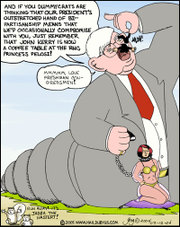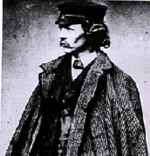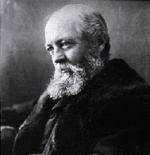Some day, when Republicans are truly politically dead, not just wounded as they are now, we need to return to the idea of the Commons. (The picture of Bruce Kushnick to the left is getting a bit old — send us a new one, Bruce!)
Not Communism, asshole. The Commons. Parks, forests, content, seas, air, software…and most important, spectrum.
Right now, in Washington, so-called regulators and so-called competitors are doing their little spectrum dance again.
The headline on this Washington Post story is deliberately misleading — it reads FCC Majority Backs Open-Access Plan for Airwaves. In fact that’s just not true at all.
The plan of FCC chair Kevin Martin and two Democratic commissioners is to auction off all the spectrum being abandoned in 2009 by TV stations, and to require but one-third of it built out so that all devices can use it. Martin resists even the idea of mandated wholesaling, which Google says is a pre-condition for its entry into the bidding.
(The cartoon at left was originally published by Salon.)
Republicans are salivating over the prospect of $10 billion in free
money from the "spectrum sale." As though the government were just
another private entity, seeking a windfall.
But what is being sold? The electromagnetic spectrum is not, by its
nature, property. Nor should it be. Sunlight comes to us over spectrum,
sound comes to us through spectrum. Will the government next sell the
right to see and hear to the highest bidder, and consider it good
business if AT&T is then able to charge us for the privilege?
No!
Bruce Kushnick, whose $200 Billion Scandal inspired this blog (this
remains its name on Typepad), writes he is now working on a Divestiture
II paper. AT&T was broken up in 1984, but has been put back
together and is now squeezing us all tighter than ever — with
government help.
I agree with Bruce. The goal of government regulation should be, in a word, more.
More bits, more competition, more spectrum in the Commons. Anyone
hoarding anything needs to be put down, broken up, destroyed as being
against the public interest.
The public interest in this case is clear. Spectrum is not property. It
is the common right of all men, subject only to non-interference rules.
Those phone lines are not property — they were paid for by taxpayers,
through subsidies, and must be managed in the public interest. Which means more use, more bits, more traffic, not just more money for the few but more wealth for the many.
That’s not Communism, or even socialism. It’s common sense American
progressivism, the kind of leadership Republicans gave us from the mid-1880s (when
the Civil Service and ICC were created) through the 1909 Standard Oil
break-up.
In many ways, the idea of the Commons goes back much further, to the
1850s, when the center of Manhattan was taken out of private hands, and
designated a public park. A competition was held to design it, which
was won by a New York Times writer, who called his design
"Greensward." That writer, Frederick Law Olmsted,
later became the greatest landscape architect of all time, and when
asked what his message was responded, very simply, "Look. We did this
for you." (That’s him, in his old age, to the left, and the same man,
in his youth, above.)
Now we have to do it again, but this time for ourselves and our descendants.
The Bush years have brought us a true bridge to the 19th century, the
19th century of religious wars, of trusts, of workers-as-serfs, of
naked bigotry. In the last similar crisis period, in the 1890s, it was Republicans who led
the push-back. That does not look likely this time — such Republicans
have been purged from the party they once called home.
No matter. We’ll have it anyway.













I don’t know that you can just say as soon as we get rid of the Republicans we can fix this problem, and I do agree with you that this is a problem that needs fixing. While it is true that a lot of misguided current spectrum policy can be traced back to the Republican dominated congresses of the Clinton Administration, there wasn’t any effort from Democrats to stop them back then and there still isn’t today. Where were Reed Hundt’s populist notions when he was actually Chairman of the FCC? Back in those days he was all about bragging how much money spectrum auctions had raised.
I don’t know that you can just say as soon as we get rid of the Republicans we can fix this problem, and I do agree with you that this is a problem that needs fixing. While it is true that a lot of misguided current spectrum policy can be traced back to the Republican dominated congresses of the Clinton Administration, there wasn’t any effort from Democrats to stop them back then and there still isn’t today. Where were Reed Hundt’s populist notions when he was actually Chairman of the FCC? Back in those days he was all about bragging how much money spectrum auctions had raised.
Dana:
I don’t know if you will find it helpful, but I have written my own version around the First Amendment arguments and a way forward in an article I wrote for Commlaw Conspectus:
http://commlaw.cua.edu/articles/v15/feld.pdf Briefly, I argue that while exclusive licensing has not yet been supplanted by technology that enables everyone to use the spectrum, the First Amendment compells the FCC to work to that result.
Dana:
I don’t know if you will find it helpful, but I have written my own version around the First Amendment arguments and a way forward in an article I wrote for Commlaw Conspectus:
http://commlaw.cua.edu/articles/v15/feld.pdf Briefly, I argue that while exclusive licensing has not yet been supplanted by technology that enables everyone to use the spectrum, the First Amendment compells the FCC to work to that result.